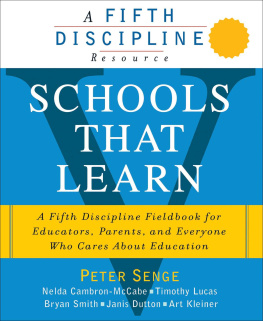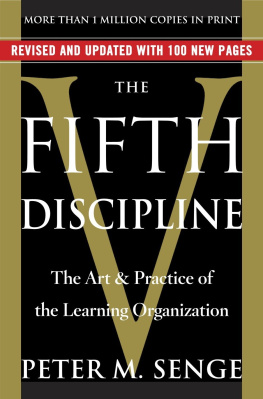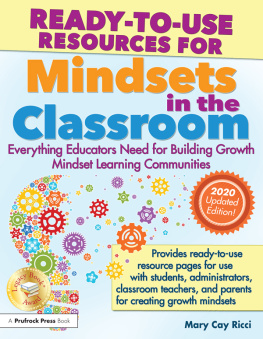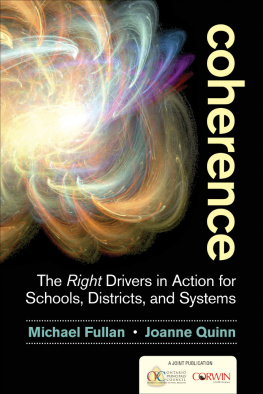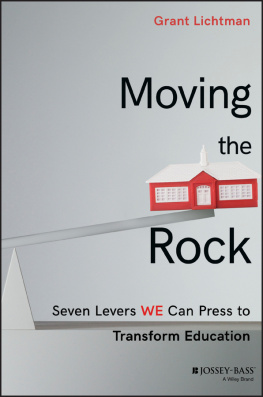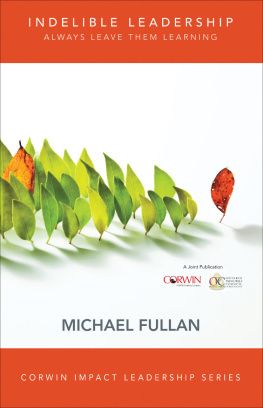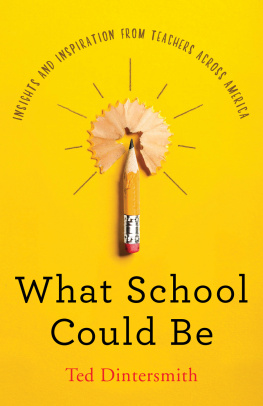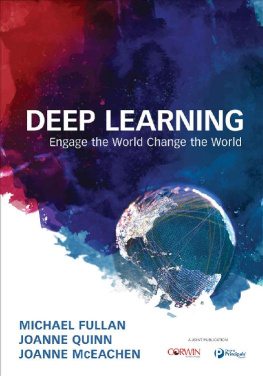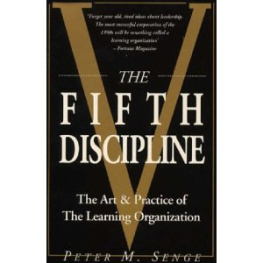Peter M. Senge - Schools That Learn: A Fifth Discipline Fieldbook for Educators, Parents, and Everyone Who Cares About Education
Here you can read online Peter M. Senge - Schools That Learn: A Fifth Discipline Fieldbook for Educators, Parents, and Everyone Who Cares About Education full text of the book (entire story) in english for free. Download pdf and epub, get meaning, cover and reviews about this ebook. year: 2012, publisher: Crown Business, genre: Science. Description of the work, (preface) as well as reviews are available. Best literature library LitArk.com created for fans of good reading and offers a wide selection of genres:
Romance novel
Science fiction
Adventure
Detective
Science
History
Home and family
Prose
Art
Politics
Computer
Non-fiction
Religion
Business
Children
Humor
Choose a favorite category and find really read worthwhile books. Enjoy immersion in the world of imagination, feel the emotions of the characters or learn something new for yourself, make an fascinating discovery.
- Book:Schools That Learn: A Fifth Discipline Fieldbook for Educators, Parents, and Everyone Who Cares About Education
- Author:
- Publisher:Crown Business
- Genre:
- Year:2012
- Rating:3 / 5
- Favourites:Add to favourites
- Your mark:
Schools That Learn: A Fifth Discipline Fieldbook for Educators, Parents, and Everyone Who Cares About Education: summary, description and annotation
We offer to read an annotation, description, summary or preface (depends on what the author of the book "Schools That Learn: A Fifth Discipline Fieldbook for Educators, Parents, and Everyone Who Cares About Education" wrote himself). If you haven't found the necessary information about the book — write in the comments, we will try to find it.
-Daniel H. Pink, author of DRIVE and A WHOLE NEW MIND
Schools that Learn is a magnificent, grand book that pays equal attention to the small and the big picture - and whats more integrates them. There is no book on education change that comes close to Senge et als sweeping and detailed treatment. Classroom, school, community, systems, citizenry---its all there. The core message is stirring: what if we viewed schools as a means of shifting society for the better!
-Michael Fullan, author of Change Leader and Learning Places
A new edition of the groundbreaking book that brings organizational learning and systems thinking into classrooms and schools, showing how to keep our nations educational system competitive in todays world.
Revised and updated - with more than 100 pages of new material for the first time since its initial publication in 2000 comes a new edition of the seminal work acclaimed as one of the best books ever written about education and schools.
Aunique collaboration between the celebrated management thinker andFifth Disciplineauthor Peter Senge and a team of renowned educators and organizational change leaders,Schools that Learn describes how schools can adapt, grow, and change in the face of the demands and challenges of our society, and provides tools, techniques and references for bringing those aspirations to life.
The new revised and updated edition offers practical advice for overcoming the many challenges that face our communities and educational systems today. It shows teachers, administrators, students, parents and community members how to successfully use principles of organizational learning, including systems thinking and shared vision, to address the challenges that face our nations schools. In a fast-changing world where school populations are increasingly diverse, children live in ever-more-complex social and media environments, standardized tests are applied as overly simplistic quick fixes, and advances in science and technology continue to accelerate, the pressures on our educational system are inescapable.Schools That Learnoffers a much-needed way to open dialogue about these problems and provides pragmatic opportunities to transform school systems into learning organizations.
Drawing on observations and advice from more than 70 writers and experts on schools and education, this book features:
-Methods for implementing organizational learning and explanations of why they work
-Compelling stories and anecdotes from the field - classrooms, schools, and communities
-Charts, tables and diagrams to illustrate systems thinking and other practices
-Guiding principles for how to apply innovative practices in all types of school systems
-Individual exercises useful for both teachers and students
-Team exercises to foster communication within the classroom, school, or community group
-New essays on topics like educating for sustainability, systems thinking in the classroom, and the great game of high school.
-New recommendations for related books, articles, videotapes and web sites
-And more
Schools That Learnistheessential guide for anyone who cares about the future of education and keeping our nations schools competitive in our fast-changing world.
Peter M. Senge: author's other books
Who wrote Schools That Learn: A Fifth Discipline Fieldbook for Educators, Parents, and Everyone Who Cares About Education? Find out the surname, the name of the author of the book and a list of all author's works by series.

